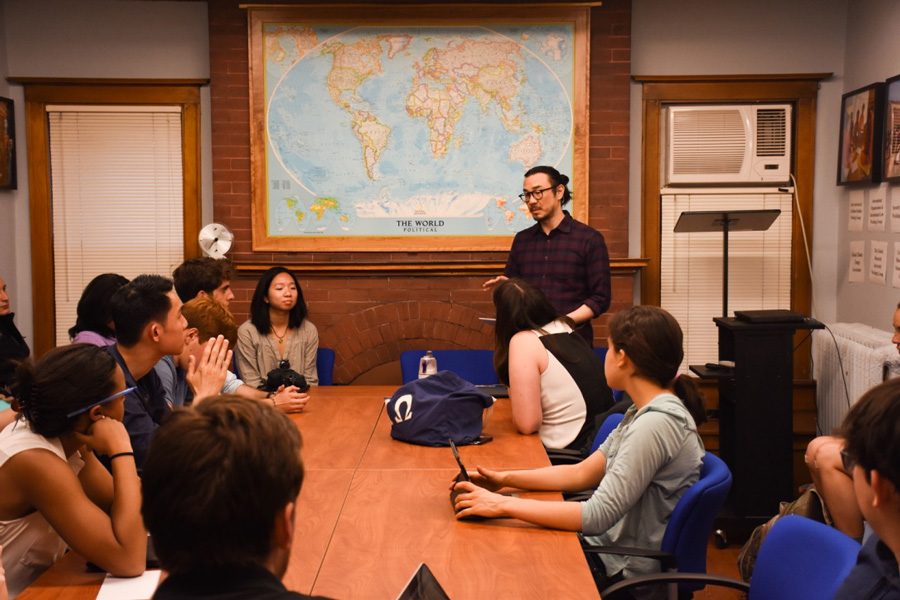Students debate fairness of affirmative action at Political Union event
Sophie Mann/The Daily Northwestern
Students participate in a Political Union-sponsored debate about affirmative action. More than 50 students attended the event, which was co-sponsored by Asian Pacific American Coalition.
May 24, 2016
More than 50 students attended a debate Monday night about affirmative action co-hosted by Northwestern’s Political Union and Asian Pacific American Coalition at the Buffett Institute for Global Studies, discussing the role race should play in college admissions.
The event featured a presentation from sociology Prof. Anthony Chen, student speakers and an open debate.
Weinberg freshman Jose Trejos said during the debate that affirmative action only scratches the surface in addressing systemic issues faced by non-white students.
“Affirmative action is unforgivably used as a Band-Aid by the same people who allowed the educational system to get so messed up in the first place,” Trejos said. “If you want to help minorities achieve more education, you should fight the real problems in primary and secondary education instead of trying to continue this cynical and failed policy of higher education.”
Trejos, a Daily columnist, argued that minority students lack access to quality early education, and reforms should focus less on the admissions process and more on preparing students for college itself.
But Weinberg sophomore Max Rowe countered that by saying Trejos’ arguments discounted the importance of racial diversity on college campuses. Rowe said although affirmative action is flawed, race-blind admissions would harm minorities more.
Communication freshman Michael Deneroff added that a single policy such as affirmative action cannot fix everything but could help remedy inequality.
“I agree affirmative action is a Band-Aid solution,” Deneroff said, “but wounds heal better when they’re supported, not when they’re left raw.”
But Trejos, an international student from Costa Rica, said he opposes affirmative action because it acts as an unfair advantage for the already privileged top tier of minority groups.
Trejos compared himself, a Hispanic student whose father went to college, to impoverished students who live miles from his home in Costa Rica.
“When I see affirmative action, I see a system that helps people like me by taking spots away from people like them,” Trejos said. “I would like to see a system that is more holistic and … affirmative action, at least as it is right now, is so broken that the only way you can achieve that is abolishing it completely and starting from scratch.”
SESP freshman Sky Patterson countered that minorities are constantly living in systematic disadvantage and affirmative action is necessary to level the still-uneven playing field. Patterson added that it is “misguided and shortsighted” to view affirmative action as unfair.
Medill sophomore David Gernon, Political Union co-president, said the debate exceeded his expectations. He said the goal of the organization is to make students think deeper about issues, something the affirmative action debate was able to achieve.
“You realize it’s a lot more nuanced,” Gernon told The Daily. “There’s a lot of structural problems that need to be corrected.”
Weinberg sophomore Stacy Tsai said she was pleasantly surprised by the event. As APAC’s external president, Tsai said she made an effort to bring Asian-American students to the debate to make sure they were involved in the conversation.
“The topic of affirmative action is often labeled as a black, Latino issue,” Tsai told The Daily. “It’s very clear that Asian-Americans have a stake in affirmative action.”
Email: kellinguyen2019@u.northwestern.edu
Twitter: @kellipnguyen



